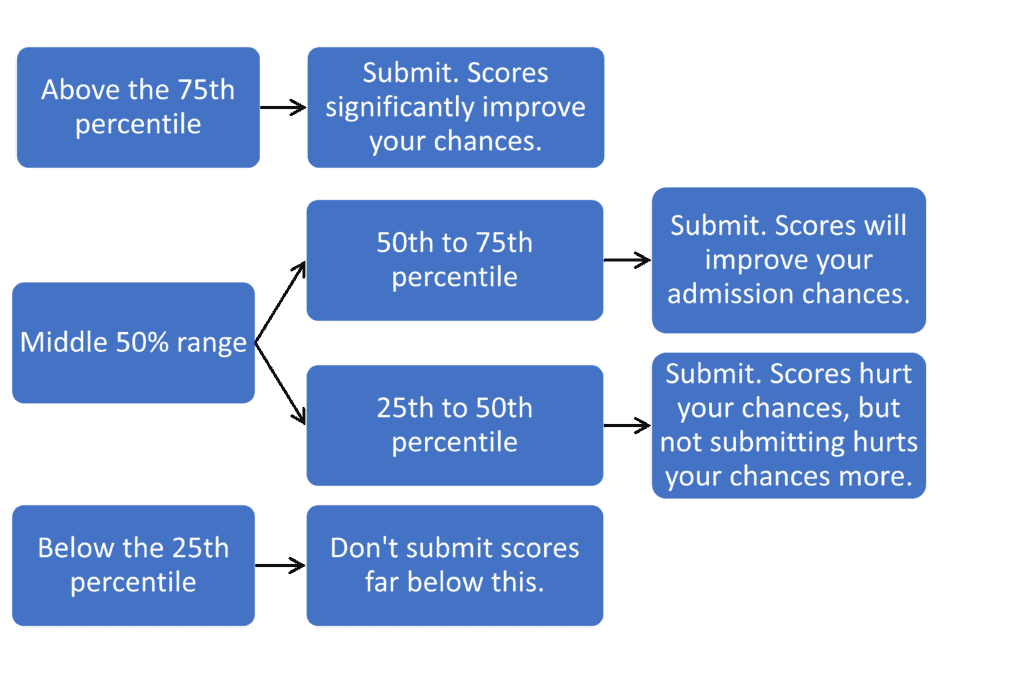Table of Contents
- Research
- Decide whether to submit
- Am I likely to be admitted if I submit a score below the 25th percentile?
- Won’t submitting a score below a college’s 25th percentile bring down their average?
- Do SAT and ACT scores actually help predict college outcomes?
- Should I always submit my SAT or ACT score?
- If I don’t fit an institutional priority, can I still get in without test scores?
- Anything else I should know?
There has been too much misinformation about this topic, so here’s a guide for what most students should do.
Research
First, Google a college’s median SAT or ACT score. That typically generates search results that provide the middle 50% of SAT or ACT scores for the college.
See which range your score falls in and use the chart below.

Decide whether to submit
As you can see, you should only withhold test scores if you are below the college’s 25th percentile. And, even then, it can actually be borderline whether or not to submit.
For example, Yale’s middle 50% score range is from 1460 to 1580. If a student has a 1400-1450, though, then I would still submit it. Why? Because those are still very solid scores that indicate a student is at or above the top 7% of test takers. A student with a 1400+ is likely to be able to succeed at Yale.
However, if you don’t submit a test score to Yale, then Yale is very likely to assume that your score is below 1400. So not submitting a test score would likely hurt your admission chances more than submitting a score of 1400 to 1450, even though the latter score range is below Yale’s 25th percentile.
How do we know that test scores below the 25th percentile might actually help a student (or, not hurt a student as much as not submitting test scores)? Because Yale itself says so.
“Applicants who have successfully completed one or more ACT or SAT exams should consider including scores, even if those scores are below the middle 50% ranges listed below. Yale’s internal research has consistently shown that ACT and SAT scores are a significant predictor of a student’s undergraduate academic performance. When students include scores with their applications, the Yale Admissions Committee evaluates them within each student’s unique context and uses them to augment other academic indicators throughout the application.”
Yale Admissions Website
https://admissions.yale.edu/standardized-testing
Dan Bishop, Associate Vice President for Undergraduate Enrollment at the University of Notre Dame, provides a similarly candid take: test-optional admissions premised on students only submitting test scores above the median are not mathematically sustainable. This strategy may have been viable in year one during the pandemic when most colleges suddenly became test-optional, but if it continues and only students above the median submitted and were accepted, then the median would keep moving up to the point that very few students would be submitting test scores to the university (and if fewer than 50% of a college class submitted scores, then a college’s ranking gets automatically decreased by U.S. News and World Report).
Note: If a student comes from a high school known by top colleges to be of high caliber, then the colleges may feel confident enough in a student’s high school GPA to grant them admission without test scores — and, in those instances, the college would rather not have an SAT/ACT score below the median 50% (because why bring down their average if they feel confident already in the student’s success at their institution?). There are some other nuances too, so it’s always a good idea to check with an admissions professional for guidance on your particular circumstances.
Am I likely to be admitted if I submit a score below the 25th percentile?
No. For example, you are unlikely to get into Yale with a 1400. You’re not even likely to get into Yale with a 1500. But, all colleges heavily recruit students who meet their “institutional priorities.” Those priorities vary based on the college, but they can include recruited athletes, Pell grant students, students who help bring more diversity to campus, etc. If you meet an institutional priority, then you’re not competing against all the other applicants. You are competing against all the other applicants that meet the same institutional priority that you do.
Consider the decision process of top colleges when they are considering two Pell grant students with equally great grades, both students are from unknown schools (so a college doesn’t have the data for how students from those high schools do at their college), and one applicant does not submit a test score and the other submits a 1400 SAT score:
- Students don’t choose to withhold their test scores because their scores are too high, so the college knows that the student who did not submit a test score had a test score that was below its median SAT/ACT score. Not submitting a test score is essentially submitting an ambiguously low test score.
- But, because the score wasn’t submitted, the college has no idea how far below the median the student’s score actually is.
- In this instance, top colleges are likely to choose the certainty of a still very good score below their median over the uncertainty of an unsubmitted score that might be very far below their median.
Again, though, the latter example is very specific: two equal applicants to a top college who both meet an institutional priority. But it shows how, in some circumstances, it can still be beneficial to submit test scores slightly below a college’s median.
Won’t submitting a score below a college’s 25th percentile bring down their average?
Yes. For example, Yale would be bringing down its average SAT score by accepting a student with a 1400. But colleges care much more about actual student outcomes than their average SAT/ACT score. Outcomes (graduation rates, retention rates, etc.) are dramatically more impactful on college rankings. In the U.S. News and World Report ranking, measures of outcomes account for 35% of a college’s ranking. What about average test scores? 5%. If they have to choose between outcomes and average test scores, they will choose outcomes every time (and that’s the right thing to do to help ensure that they are admitting those students who have the highest chances of succeeding at their institution).
Do SAT and ACT scores actually help predict college outcomes?
Yes. But don’t take my word for it. Hear it straight from the colleges.
“SAT and ACT tests are better predictors of Harvard grades than high school grades…”
Harvard’s Admissions Website
“Yale’s internal research has consistently shown that ACT and SAT scores are a significant predictor of a student’s undergraduate academic performance.”
Yale’s Admissions Website
“Our ability to accurately predict student academic success at MIT is significantly improved by considering standardized testing — especially in mathematics…”
MIT’s Admissions Website
This one actually sounds like satire, but it’s real: “Buy a study guide and begin taking practice SAT and ACT tests.”
Duke’s Admissions Website
“While high school grades are a strong predictor for academic success in college, the combination of grades and standardized test scores has been shown to strengthen that prediction.”
Northwestern’s Admissions Website
It keeps going.
Suffice it to say, yes, test scores help predict college outcomes and decades of research covering millions of students has, again and again, validated that this is the case. Even the two largest studies that argue in favor of decreasing standardized testing’s importance in admissions still found that the scores help predict college outcomes.
Should I always submit my SAT or ACT score?
No. For example, if you have a 1200 and you’re applying to Yale, then don’t submit — not even if you’re a student who meets an institutional priority. Because they don’t want to bring their average test scores down that much. And, you still might get in without test scores if you’re a high enough institutional priority, have stellar grades in very rigorous courses (and probably have 5’s on numerous AP exams), a stellar essay, etc.
For instance, if you’re the only Pell Grant student applying from Nebraska and you have great grades, then you still might get in without submitting test scores because you are probably the only student applying from Nebraska — maybe ever. (Sorry to pick on you Nebraska, but, because no one lives there, this will offend no one. Also, I’m from New Jersey, so I’ve now given you plenty of ammo for a devastating rebuttal.)
If I don’t fit an institutional priority, can I still get in without test scores?
Maybe. It really depends on the caliber of the school. If you’re applying to a selective or highly selective college, you are not submitting scores, and you don’t fit an institutional priority, then, yeah, you’re very, very likely to be denied. Maybe a stellar essay will save you, but it’s unlikely.
But, most schools are not selective or highly selective. Most schools accept a majority of applicants, and so most students with grades at or above those colleges’ average have a good chance at admission without test scores. Granted, those schools are still more likely to give more aid and scholarships to applicants with high test scores. But, most students will at least be able to gain admission to a decent school without submitting test scores.
Anything else I should know?
You are not alone in your confusion and consternation at this opaque process. But, it is a double-edged sword. Students were clamoring for test-optional admissions. Now we see the other edge: colleges are using test-optional to their own advantage to more easily admit students who fit their institutional priorities. If you fit their priorities, that’s great: a win for you and a win for the college. If not, then that’s not so great because test-optional admissions actually create more competition among top students for top scores as colleges’ average SAT and ACT scores creep up because students with lower scores who can still gain admission don’t submit their scores.
I suppose I should end on a happy note though. 🙂
The SAT and ACT evaluate students on fundamental grammar, rhetoric (such as how to best construct paragraphs and essays), mathematics, reading comprehension, and data analysis (such as reading graphs and tables). These are skills that will help students excel in high school, in college, and in life. And these are skills that all students can improve upon. If you put in the hard work (it will be hard work), you can and will succeed and increase your proficiency in valuable skills, increase your scholarship chances, and increase your chances of admission to your desired college.








